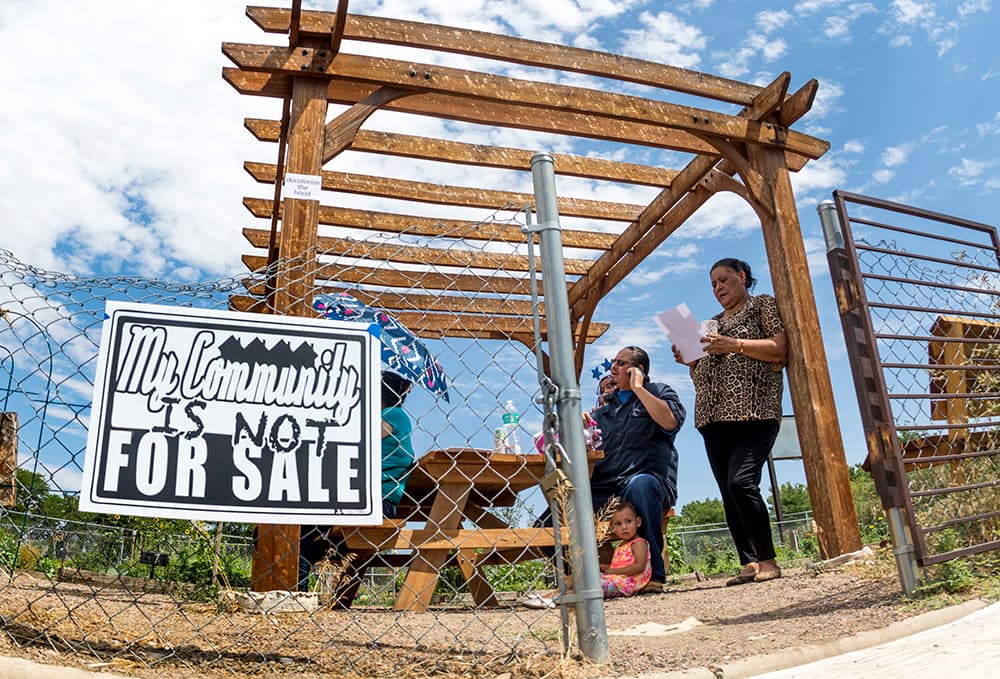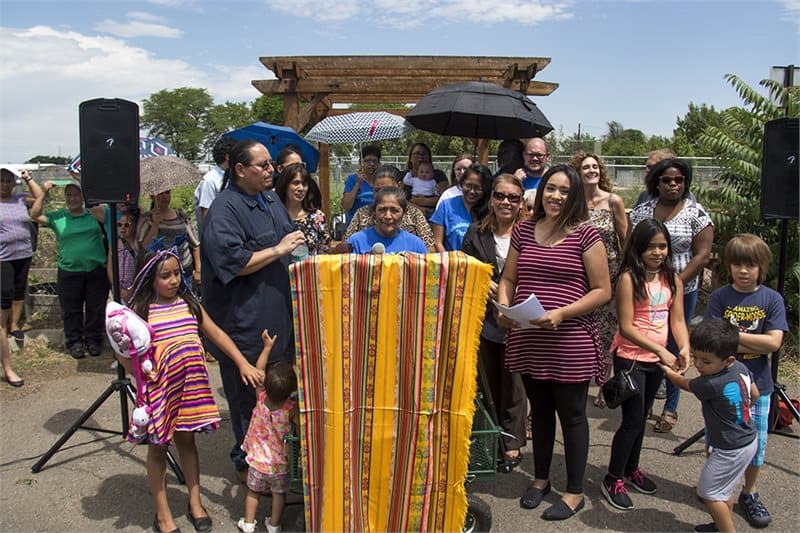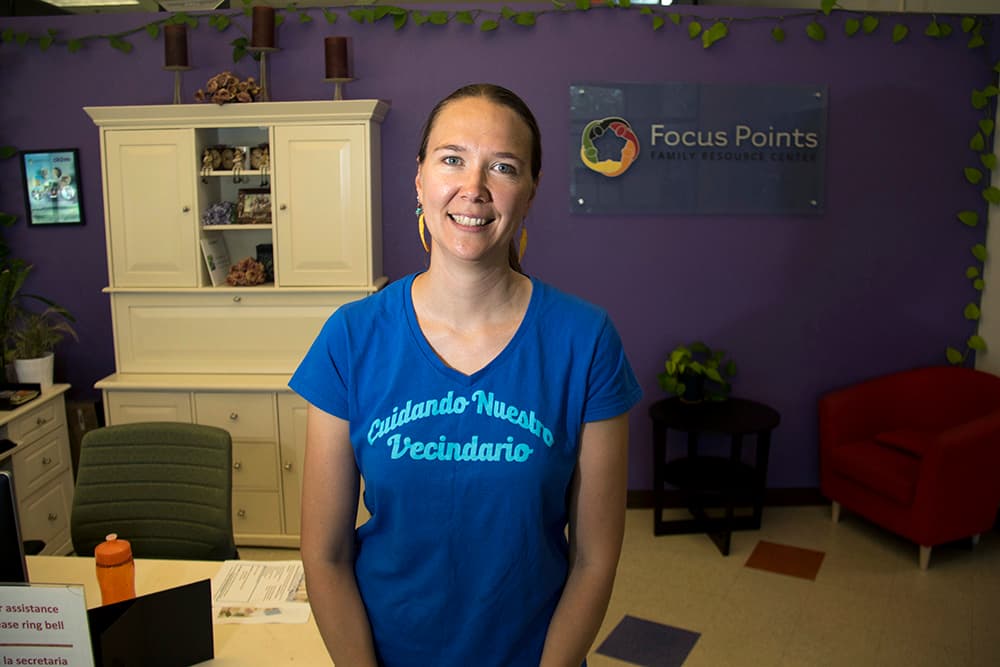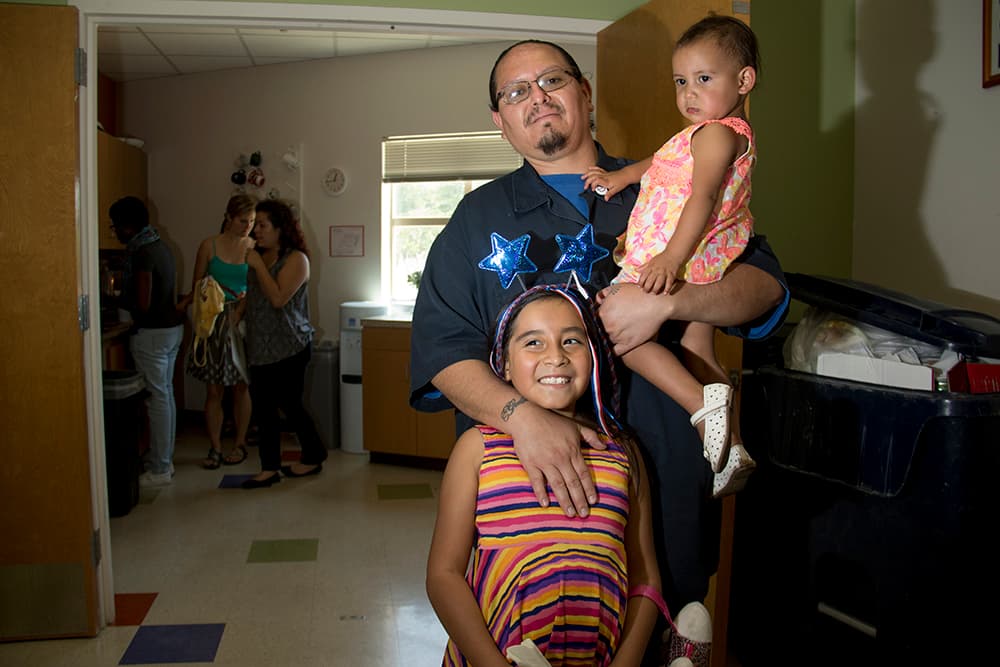
Community members in Globeville and Elyria-Swansea want to raise between $2 million and $3 million in the next year to start a modest demonstration project that could provide the model for stopping displacement in these predominantly Latino and low-income neighborhoods.

The GES Coalition Organizing for Health and Housing Justice wants to start a community land trust, a practice that has helped preserve affordable housing in changing neighborhoods around the country. By owning the land underneath the homes, this type of land trust can prevent the rapid appreciation that ends up driving out long-term residents when neighborhoods see an influx of newcomers and investment.
The Coalition announced the effort -- which does not yet have any financial commitments from any partners -- Tuesday along with the release of a study on gentrification in the area that was carried about by community members going door to door to collect some 500 survey responses.
The findings mirrored those of other reports -- Globeville and Elyria-Swansea residents are particularly vulnerable to displacement because most renters have no lease and they're very low-income. They can be evicted on short notice, and they can't afford other housing in the city. The neighborhoods have remarkably high rates of home ownership given the income levels, but many homeowners are older and retired or unemployed. They're particularly hard hit by property tax increases as home values rise.
Survey responses show that 51 percent of renters have no lease at all, and 61 percent earn less than $25,000 a year. GES renters are families with 3 or more adults (50 percent), and 2 or more children (64 percent). Given the shortfall of affordable housing units in Denver, the large family sizes, and incomes below the 30 percent AMI level, few affordable units currently under construction meet the needs of residents. The lack of leases and renters rights means these families are vulnerable to evictions, forced relocation, and homelessness.
And then there is this significant finding:
Given the option GES residents want to stay in their community (80 percent), but absent intentional policy and advocacy this will be an unrealized dream. Projects like the I-70 expansion, National Western Center, and RTD’s A Line, are having a substantial impact on the market, as is private speculative real estate transactions.
The proposed community land trust is one piece of the "intentional policy" that activists think can stem the tide.
Nola Miguel, director of the Coalition, said the initial demonstration project would include 10 homes. The Coalition will seek money from the city's affordable housing fund, the Colorado Department of Transportation and the National Western Center but also private sources.
Erik Soliván, director of the Mayor's Office of HOPE, which coordinates housing policy, said he "welcomes a conversation" around a community land trust. The city is in the process of developing a plan for how to spend the money generated by its new affordable housing fund, which will be placed into a revolving loan fund.
"Land trust is a very complex tool for addressing affordability and displacement," he said. "You need a lot of partners with housing finance expertise as well as banks who are willing to finance a deed-restricted property that limits the equity you can pull out. ... These are not simple transactions. Always, there are hurdles. But they can be very effective tools."
The plan is due to be released in September, a short time from now when you're traveling at the speed of government, but GES residents said they want to hear from Mayor Michael Hancock now.
"As the mayor said, this is important to him, it cuts him to the core, and that's why we want to have all the tools available," Soliván said, referencing Hancock's state of the city address.

As part of the record of decision around the I-70 expansion, CDOT promised to give $2 million toward affordable housing in the neighborhood, but there is no plan right now for who will get that money or how it will be spent.
A consultant's report prepared for the Denver Office of Economic Development said CDOT should invest $14.5 million in the surrounding neighborhood to make up for the loss of 56 homes to the widening of I-70 and the changes to the local real estate market that the project will provoke.
CDOT spokeswoman Rebecca White said CDOT has never given money for affordable housing with any prior project, and the agency ultimately decided that $2 million was "fair and appropriate" after talking with housing experts who said that would be a good amount to kick-start a project or leverage other funds. White said CDOT is open to hearing a proposal related to the community land trust, but the agency hasn't made any decisions -- and won't for some time -- about the best place to put that money.
GES Coalition is working with Grounded Solutions, which has worked on land trusts around the country, as well as the Colorado Community Land Trust, which runs land trusts in Lowry and Cole, to understand the requirements of such an entity, establish a community governance structure and get off the ground.
Jane Harrington, executive director of the trust, said she's excited about working with residents of Globeville and Elyria-Swansea, but a lot of work and research remains to be done.
Last year, discussing the idea of a GES land trust, Harrington told me there are real barriers.
The land trust provides safe, quality housing and only sells to people who won’t be burdened by the mortgage. Many of the older homes in north Denver need serious repairs — electric redone, sewer lines replaced, mold remediated. And mortgages that would be modest for many homebuyers could overwhelm these households.
“Flipping is basically what we would be doing, but with a severe cap,” Harrington said. “If I have to spend $300,000 to buy and renovate that house and I sell it for $150K, I have a real problem. And if we’re trying to not displace anyone, can the household afford for us to take it over and fix it up?”
Miguel said she believes these barriers can be overcome. The right financial structure can allow for subsidies to cover the gap between costs and what residents can afford. There are three elements of the cost: ongoing operating expenses, home rehabilitation and the subsidy many homeowners would need.
There are also different populations that land trusts can serve, with some helping homeowners who risk losing their homes and others providing homes that renters could buy. These owners would build equity, though not as much as someone in a home they owned outright.
Miguel said the latter structure seems most likely for this land trust.
From a demonstration project of 10 homes, the hope is that the land trust could grow to provide more housing for long-time residents.
At a press conference at Focus Points in Swansea, resident after resident described displacement as a threat not only to their community but to the health of their families.
"I hope we're able to get more affordable housing for our community," said Rey G., a member of the coalition and the United Community Action Network, who prefers not to use his last name in print. "I want to make sure the people who have lived here for generations are able to stay here."
An artist and community organizer, Rey is a homeowner and fourth generation Globeville resident, but rising property values are putting stress on his family as he struggles to stay on top of his taxes, he said.
"We've become working poor," he said. "There is a lot of stress, and that's not good for anything. The family structure and the dynamics of the family are affected. Everyone is thinking about money and how we can get more of it, and that's not what's most important in life."
Raymunda Carreón, who saw her rent go up when her home was sold to a new owner and who lives without an annual lease, said that like many of her neighbors, she would like to be a homeowner to stay in her community.
"It's impossible to find an affordable house in the area," she said. "We've been researching the idea of a community land trust to respond to this crisis of displacement that is happening in our community."
Community activist Candi CdeBaca said the neighborhood needs housing investment that corresponds to the massive investments the city is making in the National Western and to the I-70 project. She said residents wonder if the projects outlined in a proposed $937 million bond project are being built for them -- or for future more well-off residents.
"There are not balanced investments nor policies that will prevent GES neighbors from being displaced before these amenities are manifested," she said. "Public investments should be directed and driven by community members, and when they are not, we know so-called solutions will continue to perpetuate patterns of displacement and exploitation of the community's resources.
"Policy makers, we ask that you make bold moves to stabilize our communities."
CdeBaca laid out ways the city could make a meaningful difference:
- community land trust
- protections for renters
- programs to help renters become homeowners
- protections from predatory developers and real estate agents
- preference for displaced residents in affordable housing projects
"We need the people to rise up, and we need our elected policy makers to take their cue from us. We have the right to stay in our community and shape the future of our community," she said.

This story has been updated throughout with additional reporting.











